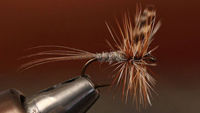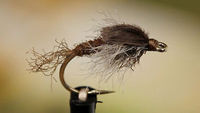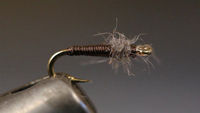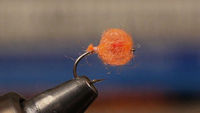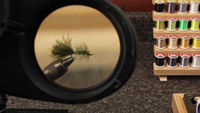- Home

- Fly Tying Videos

- Nymph Fly Patterns

- McKenna’s Sexy Walt’s Worm
McKenna’s Sexy Walt’s Worm Pattern & Tying Instructions
<iframe src="https://howtoflyfish.orvis.com/embed/1076" width="560" height="370" frameborder="0"></iframe><br/><a style="color: #3C6015; font-family: Arial;" href="https://howtoflyfish.orvis.com/fly-tying-videos" target="_blank">See All Orvis Learning Center Fly Tying Videos</a>
Fly Tying Recipe:
McKenna’s Sexy Walt’s Worm
- Hook:
- Black nickel jig hook (here a Fulling Mill FM50 45), sizes 12-16
- Bead:
- Pink slotted tungsten bead, 3mm
- Weight:
- Lead-free round wire, .020
- Thread:
- White Veevus 10/0
- Rib:
- Silver wire, small
- Body:
- Gray SLF Dubbing
- Thorax:
- Hot purple SLF Prism Dubbing
- Hot Spot:
- Fluorescent red thread
- Adhesive:
- Head cement
- Tools:
- Dubbing wax
Video Transcript:
Dave McKenna works for Douglas Outdoors and his job involves a quite a bit of travel, especially throughout the continental United States. Over the years, Dave has developed a number of patterns he’s found work nearly anywhere, at any time. So rather than carry a myriad of locally specific fly patterns, he can just carry a few in a variety of sizes and colors to fit most of his needs. This Sexy Walt’s Worm Variation is one such pattern that because of its weight, works particularly well in fast and deep water.
Dave starts with a Fulling Mill size 14 barbless jig hook. He pairs it with a 3 mm pink slotted tungsten bead. After getting the assembly firmly secured in his tying vise, Dave picks up a spool of .02 round lead-free wire and adds four turns to the shank of the hook, then snips the excess off close.
For thread, he’s loaded a bobbin with a spool of white Veevus 10/0. Get your thread started on the hook shank behind the weight and take a few wraps rearward before snipping off the tag. Continue taking thread wraps over top of the weight to anchor it behind the bead. End with your tying thread at the back edge of the weight.
Small silver Ultra wire is used for the rib. A 10” length is enough to make numerous flies. Secure the wire to the hook shank with tight wraps of tying thread. Continue taking thread wraps all the way back to the start of the bend, then go over everything with thread wraps to make sure it’s bound down really well.
Next, Dave applies just a light skim of dubbing wax to his tying thread. The body of the fly is created using grey Davy Wotton SLF dubbing. Start with a fairly small pinch. Apply the dubbing to your tying thread forming a nice, slender noodle. Then take wraps with it to build up the body of the fly. If you need more dubbing, go for it. It’s always easier to add dubbing than it is to take dubbing away.
Get hold of the silver wire and start making open spiral wraps with it over top of the dubbed body. 4-5 turns usually looks pretty good. When you reach the bead, use your tying thread to anchor the wire then snip it off close.
Dave once again adds a little wax to his tying thread and this time chooses hot purple SLF prism dubbing, just a wisp is all you need. Form a short svelte noodle on your tying thread and take wraps with it to build up a narrow collar behind the bead. You can then do a 3 or 4 turn whip finish, seat the knot well and snip your tying thread free.
Red Glo-Brite fluorescent floss is used to produce a hot spot collar. Start the thread immediately behind the bead and take just a couple of wraps before snipping off the tag. Then go right into a 3 or 4 turn whip finish before seating the knot well and snipping your tying thread free. Adding a drop of head cement to the thread wraps will ensure they don’t come unraveled.
And that’s Dave McKenna’s version of a Sexy Walt’s Worm. It might be a good idea to carry a few of these in different sizes, not only when you travel but when you fish your home waters as well.
More Fly Tying Videos




